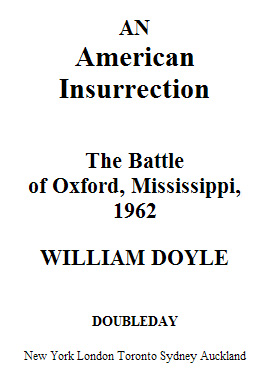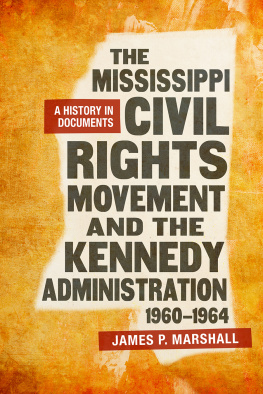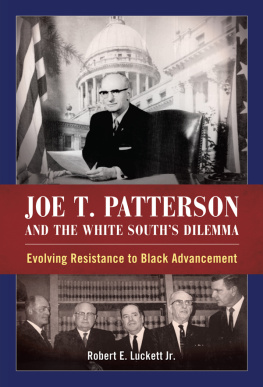

Contents
PROLOGUE
The Past Is Never Dead
CHAPTER ONE
Whom Shall I Fear?
CHAPTER TWO
The Warrior
CHAPTER THREE
The Incendiary Man
CHAPTER FOUR
We Shall Be Invincible
CHAPTER FIVE
Order of Battle
CHAPTER SIX
In the Lords Hands
CHAPTER SEVEN
Though the Heavens Fall
CHAPTER EIGHT
The Gates of Bedlam
CHAPTER NINE
Demons Out of the Earth
CHAPTER TEN
The Silent Pillar
CHAPTER ELEVEN
The Guns of Midnight
CHAPTER TWELVE
History Will Not Forget You
CHAPTER THIRTEEN
A New Civil War Has Begun
CHAPTER FOURTEEN
A Wall of Fire
CHAPTER FIFTEEN
After the Dawn
CHAPTER SIXTEEN
The New Age
EPILOGUE
The Greatest Suppertime of All
to Naomi
to my father, William Doyle,
First Sergeant, U.S. Army
813th Military Police Company, 19421945
Australia and New Guinea
and to Marilou, Kate, and Joe
I was creating images then that were designed for forty years in the future.
James Meredith
This story in years to come, in generations to come, is going to be really a story that will be impossible to believe.
Verner Holmes
PROLOGUE
The Past Is Never Dead
The past is never dead. Its not even past.
William Faulkner
M AY 22, 1865, 9:00 A.M.: the Governors Office, State Capitol, Jackson, Mississippi.
Forty-three days after the surrender of the Army of Northern Virginia at Appomattox, a platoon of black Union troops with fixed bayonets stormed through the ruined streets of Jackson and onto the grounds of the Mississippi State Capitol building. The troops were led by white U.S. Army Brigadier General E. D. Osband. They marched toward the office of Governor Charles Clark.
Two days earlier, the soldiers had invaded the Mississippi state legislature, declared the gathering an illegal assembly, and dissolved it, waving the legislators out of the building at bayonet point. Now Governor Clark heard the measured clap of soldiers marching grow louder in the marble hallway, and presently General Osband appeared in the doorway.
The general saluted the governor, and read to him a proclamation by the president of the United States, dissolving Mississippis government.
Governor Clark was an elderly, dignified veteran of the Mexican War whose limbs were shattered at the battle of Shiloh. The old man straightened his battered legs and struggled up onto his crutches.
General Osband, the governor announced defiantly, I denounce before high heaven and the civilized world this unparalleled act of tyranny and usurpation. I am the duly and constitutionally elected Governor of the State of Mississippi. I would resist, if it were in my power, to the last extremity the enforcement of your order. I yield obedience because I have no power to resist.
Within moments the federal troops invaded the executive office, seized the governors office furniture, records, and the Great Seal of the State of Mississippi and escorted the governor out of the building. In that instant the government of Mississippi was decapitated, and the state was under the direct rule of President Andrew Johnson and his military.
They inherited a ruined, ravaged land. Before the Civil War, cotton-rich Mississippi was among the wealthiest members of the Union, but now the state was decimated, with families, fortunes, and entire cities wiped out. It was also home to multitudes of black Americans suddenly living in a strange twilight world where they were no longer slaves but not yet citizens.
After a brief failed experiment with presidential reconstruction by Andrew Johnson, the radical Republican Congress passed the sweeping Reconstruction Acts in 1867 to deliver civil rights to the newly freed black populations of the formerly Confederate states. In 1868 Mississippi adopted a state constitution that promised full political equality to blacks, and in 1870 Congress voted Mississippi back into the Union and federal martial rule ended.
For the next four years, Mississippi enjoyed a fleeting springtime of black political freedom, when black voters outnumbered enfranchised whites and African-Americans held such offices as lieutenant governor, secretary of state, and speaker of the state House of Representatives; they also became sheriffs in a number of counties. The state even sent two black men, Hiram A. Revels and Blanche K. Bruce, to the U.S. Senate.
But a white backlash erupted in 1875, and Democratic-party activists linked up with remnants of the Ku Klux Klan to unleash a wave of riots and terror against blacks and their Republican allies. The mayhem raged up and down the state and killed dozens before culminating in the Democratic capture of the Mississippi state legislature in the fall elections. In 1876 Reconstruction ended as Congress grew fatigued with the problems of the South and President Rutherford B. Hayes withdrew the last federal soldiers from the region.
The ideology of white supremacy in Mississippi was sanctified in 1890 with the adoption of a new state constitution that stripped most blacks of the right to vote, thus denying the most basic right of American citizenship to much of the states population for the next seventy-five years.
A culture of unrestrained violence against blacks flourished; from 1882 to 1952, recorded lynchings of African-Americans in Mississippi totaled 534, more than in any other state. The sharecropping system held most blacks and many poor whites in economic bondage for decades to come. Mississippis official policy of racial discrimination and exploitation prevented over half of its population from becoming productive citizens, wrote University of Mississippi history professor David Sansing. Industrialization and urbanization were stymied, and economic stagnation produced years of retrenchment. The state did not have a single paved road until the 1930s.
In every aspect of race relations, Mississippi was only an extreme microcosm of the United States at large, a nation often poisoned by racism. None of the states racial problems were unique, and all were paralleled by white violence, segregation, and oppression against blacks in virtually every corner of the North and South. But as the state with both the highest proportion of black citizens and the most powerful government and police apparatus of white control, Mississippi became the racial heart and soul of the nation.
As the second half of the twentieth century began, the stranglehold of radical white supremacy on Mississippi seemed both absolute and eternal.
It would take nothing less than a miracle to break it.
CHAPTER ONE
Whom Shall I Fear?
We could have another Civil War on our hands.
President Dwight D. Eisenhower, Cabinet meeting, March 1956
L ITTLE ROCK, ARKANSAS, SEPTEMBER 8, 1957, 8:50 A.M.
A shy fifteen-year-old girl wearing bobby sox, ballet slippers, and a crisp black-and-white cotton dress stepped off a bus and walked toward Central High School, carrying a set of school books.
Elizabeth Eckford and nine other black students hoped to enter the all-white school today as part of a desegregation plan ordered by a federal judge. Because Eckfords family did not have a phone, she had missed the instructions to join the other students this morning, so she was walking toward the school completely alone.
Until today, Arkansas was making slow, peaceful progress toward integration. The state university was quietly desegregated in 1948, the state bus system had been integrated and black patrolmen were on the Little Rock police force. Several school districts were planning to accept black students this semester. In the wake of a lawsuit by the NAACP (National Association for the Advancement of Colored People), the Little Rock school board had approved a plan to gradually desegregate Central High, and ten volunteer students were selected to go in.
Next page






